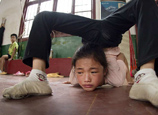
BOLOGNA, Italy, June 8 (Xinhua) -- "My name is Leone and I am from Italy. My second language after Italian is Chinese," a seven-year-old boy said introducing himself to Xinhua during the Joint Conference of Confucius Institutes in Europe held from Friday to Sunday in Italy's Bologna.
Leone was among the youngest students who attended the big conference gathering the heads of 72 Confucius Institutes and Confucius Classrooms, which focus on teaching of Chinese language and culture, from 19 countries and regions in Europe.
The three-day event started with an opening ceremony at the University of Bologna, the first higher-learning institute established in the Western world in 1088. Then in case presentations and group discussions, participants shared their experiences and views in the presence of Chinese and Italian education authorities.
In Leone's school, like in an increasing number of institutes in Italy, Chinese is a curricular language. "Our students learn Chinese from the age of six," Federica Marianti, Director of the Kinder College in Bologna, told Xinhua. She said she was set to visit China with Leone and 11 schoolmates this month to have a closer encounter with its language and culture.
"All of this came from our relation with the Confucius Institute. Our students will be among the youngest in the world to take exams of Chinese language," Marianti said.
"Children are enthusiastic and have an amazing learning ability. They study in a playful manner, for example at the lunch time, when they like to learn new names of food," the director noted.
Or, for example, thanks to a natural predilection for music, such as Alice, 10, the daughter of Italian tenor Luciano Pavarotti. Alice defined Chinese as a "catchy language thus not so difficult to learn." "Chinese is the language of the future," the little girl said explaining the reason for her choice.
Indeed, people studying Chinese language are more open to "exchange and collaborate" in all fields, including the ones of industrial, scientific and technologic relations, Italy's Education Minister Maria Chiara Carrozza told Xinhua.
The minister said that the Confucius Institutes and Confucius Classrooms play a "fundamental role in order to establish a permanent collaboration" between China and the European countries.
During the conference opening ceremony on Friday, Carrozza shared her view that "cultural exchange is the root for friendship" with Xu Lin, Director-General of Chinese Language Council or Hanban and Chief Executive of Confucius Institute Headquarters.
The two leaders especially agreed on the importance of indigenous development. By 2015 the number of qualified teachers in some 1,500 Confucius Institutes and Confucius Classrooms around the world is expected to reach 50,000 including 30,000 locally recruited teachers, Xu noted.
Among Italy's 10 Confucius Institutes and nine Confucius Classrooms represented in the gathering there was also the most recently opened one in the country, the Confucius Institute of Macerata, in the hometown of Matteo Ricci, known in China as Li Madou and remembered as the Westerner who created the first map of the world in Chinese language.
The Confucius Institute of Macerata, that started its activities last year, was rapidly implementing a variety of initiatives in collaboration with local schools and institutions also stretching to the surrounding areas, the institute's Teaching Supervisor Tommaso Pellin told Xinhua.
The past few years have witnessed the fast diffusion of Confucius Institutes and Confucius Classrooms both through the improvement of their academic quality and the popularity of their brand projects as a model for Sino-foreign educational and cultural exchange, he said.
"I was impressed by Italy's hospitality efforts and true enthusiasm," said Zhan Xinli, Vice President of Xiamen University which has set up a record number of 15 Confucius Institutes around the world, of which seven in Europe.
"The success of this conference encourages us to further join hands and work together to establish a global network of Confucius Institutes as a fundamental bridge for common development," she said.
















 Sick girl realizes dream on the stage
Sick girl realizes dream on the stage


![]()
